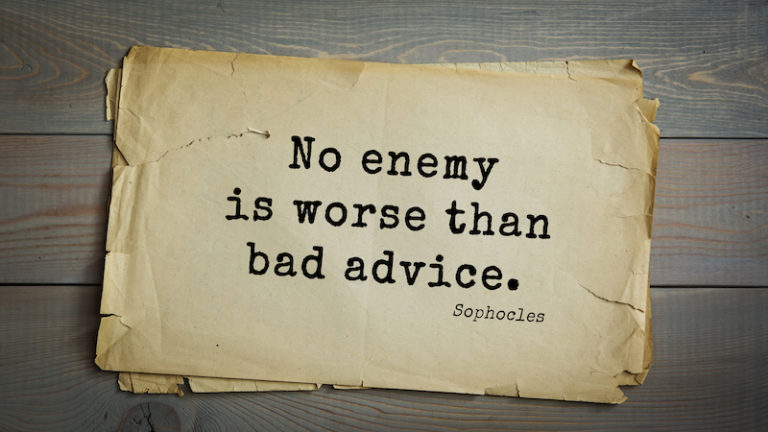
What is the worst screenwriting advice — and why?
It's easy to find great advice online, at events, and in screenwriting books. But it's also easy to find terrible words of advice that are actually things you should avoid. — bad advice that is either easily misinterpreted, outdated, or offered from sources that don't know and understand the contemporary guidelines and expectations of the film and television industry.
Here we feature seven of the worst pieces of screenwriting advice that screenwriters often fall victim to during their screenwriting journey.
1. "You Need a Writers Group."
"If you want to be a good writer, you need to be in a writers group."

Before anyone flips out and jumps to the comment section ready for war — yes, belonging to a writers group can be VERY helpful to your writing. Especially when you first start out. And it's nice to surround yourself with like-minded individuals. But you can't rely on them.
Writers groups can be beneficial for peer-to-peer feedback and general proofreading. But when you're developing and writing screenplays within a group setting, you'll often see that too many hands in the cookie jar can make your writing process that much more difficult.
Writers groups often meet bi-weekly or once a month. Some even gather as much as once a week. The writers within the group share their latest pages or development materials, depending upon where they are in the process.
While bouncing ideas off of one another and getting instant feedback online or during meetings can be helpful, it's very common for screenwriters to rely too much on their peers within the group.
And depending on the group dynamic and who is involved, you can run into the problem of having to deal with writers that have ulterior motives. Some want to project their own ideas and practices instead of reviewing your material on its own basis. Others want to lift themselves higher by making those around them feel lesser.
The less extreme outlook is that all writers have their own subjective opinions, outlooks, and perspectives. Their feedback can be helpful in that respect, but it can also hurt your script if you put too much emphasis on their notes. You will never please everyone because everyone has a differing opinion.
Unless you're writing with a partner, the screenwriting process eventually needs to be mastered by you and you alone. You can't rely on other writers to decide what directions you should take with your characters and stories. You need to create your own process and learn to trust yourself.
Yes, you can and should utilize peers to get feedback on your work, but it's best to share your completed screenplays after you've finished them. Put forward your best effort so that your peers can review the big picture of what you're trying to do.
That is when it's best to consider what they have to say because they are reacting as readers and audience members would, instead of pulling you in different directions against your own instincts while you're developing and writing the script.
2. "Ignore Formatting Guidelines and Expectations."
"Don't worry about format. Just tell your story."

In recent years, we've seen professional screenwriters push the envelope of screenplay format.
Read ScreenCraft's 7 Screenwriting Lessons A QUIET PLACE Can Teach You!
Novice screenwriters use this as an excuse to ignore the annoying screenwriting format expectations they've endlessly read about. They'll add camera directions because a produced script they've read had them. They'll ignore scene heading guidelines because that old Oscar-winning script didn't adhere to the standard practices.
Read ScreenCraft's Screenwriting Basics: The Keys to Writing Correct Scene Headings!
Or they'll write lengthy scene description because The Godfather script, or some other classic, did just fine in the end with lengthy descriptions.
When you're an established screenwriter within the industry, you've earned some leeway — especially if you're an auteur directing your own scripts. And, sure, the formatting has little to do with the quality of your characters and stories.
However, you're missing the point. The general guidelines and expectations when it comes to format exist because screenplay format is the necessary language utilized to convey cinematic stories.
When you alter that format, there's a language barrier. Communication is halted or shut down. It's an unnecessary distraction.
Format does matter. Especially when you're writing on spec because Hollywood is oversaturated with screenplays and forced to look for any reason to push a script aside and move onto the next.
Having a few camera directions here and there won't kill the read, no. But ignoring the general basics of formatting could.
Read ScreenCraft's Does Correct Screenplay Format REALLY Matter?
3. "You Need to Get Your Screenplays Out There Right Away."

"Who cares if it's your first script? You need to get it out there if you want to have a chance."
Yes, you do need to get your work out there. You can't be discovered without getting your scripts out to industry insiders.
However, there's a caveat to this that most screenwriters don't understand.
You have to give them scripts that are ready.
Your first scripts are going to be your worst. There's no escaping that. If you finish that first script and rush out to release it upon the world for all to see, you'll be doing more harm than good for your potential career.
It takes a few scripts to find your voice and hone your skills as a cinematical storyteller. Why would you send your worst work to the decision-makers in Hollywood? Why would you want to waste those networking opportunities?
The best thing that you can do for your career when you first start out is to take your time. Give yourself a year or two to write, but do so in a disciplined manner where you're developing, writing, and completing each script in just a few months.
Get yourself to the point where you have three to five solid efforts before you send out one single marketing query...
Read ScreenCraft's Writing the Perfect Query Letter for Your Scripts!
...or attempt to market your screenplays through creative networking.
Read ScreenCraft's Maps Screenwriters Can Use to Build Their Industry Network!
You can test the waters of your first scripts through the contest, competition, and fellowship market. And you can indeed utilize peer groups and paid coverage consultants to get the feedback you need to grow as a writer. But pitching scripts that aren't ready to industry insiders is counter-productive in the end.
Take your time. Be patient. Take a year or two to just write and build that stack of quality scripts. It helps in the marketing process as well because the first question they ask you is, "What else do you have?" If you only have one or two scripts, and they aren't outstanding, the opportunity is over before it really took hold.
4. "Send Out Your Script to Whoever You Can."

"Just go on IMDBPro and find any email addresses you can for the big companies. Then send queries and see who bites."
Blanketing the industry with queries isn't a smart solution to your marketing endeavors. You need a plan. You need to choose who you approach wisely.
If you're pitching your comedy to a production company that specializes in action or horror — just because you managed to get the email address of a development executive — you're shooting yourself in the foot and wasting not only your time but theirs.
You want to take the time to find the perfect place for your screenplay. You want to find industry insiders that are making what you love to write.
Work smarter not harder.
5. "Work for Free."

"You have to work for free when you first start out."
It’s tempting. You’ve struggled for so long, and now someone either wants you to write the script for a film they are going to produce, or they want to produce your script that they’ve stumbled upon. These people are often close friends, peers, or acquaintances. Sometimes your networking at film festivals will pair you with that particular filmmaker or indie producer that gets what you are writing.
They want to produce your script — assignment or not. They have the means to do it, whether it’s $10,000 or $300,000. Or maybe even more.
They’ll always say that the budget is tight — and it usually is. However, that in no way, shape, or form means that you can’t get paid. It’s tempting just to give in to see something you wrote be produced. It’s very tempting. And make no mistake, those friends, peers, and new found “besties” will likely ask you to write for free in return for onscreen credits. They’ll even more likely assume that you’ll do so without having to even discuss it.
Stop. You deserve something. Just like the sound guy deserves their fee, or the DP, or the grip, or the cast. Don’t sell yourself short just to see your name on a screen.
Read ScreenCraft's How to Negotiate a Screenwriting Contract Without Representation!
And when you start going to industry meetings once you've broken through with a script that has gotten you some notice, you may be asked to do a lot of work for free.
They may ask you to write multiple episodes of a series you're pitching. They may ask you to write long treatments. They may ask you to write numerous rewrites. They may even ask you to do a lot of work for what the industry calls open writing assignments where you create pitches, outlines, treatments, and sometimes even full script drafts, for assignments that are being offered to multiple writers. The best men or women — or those with the most connections or credits, to be honest — will get the job. This is Hollywood's way of taking advantage of screenwriters.
While you may have to suck it up and do some of this work now and then for free, remember that once you start down that path, Hollywood will take advantage of you — endlessly.
Consider taking a stand and let them — and your representation — know that you want to seek out opportunities that offer compensation for the work.
Set personal limitations. Be willing to do some work, but draw a line when it comes to extensive work like long treatments and full drafts.
Yes, you may be looked upon as naive by some. However, you may also be looked upon as more of a professional who knows what they want and is assertive enough to pursue it (this advice is given from experience).
Sometimes you may opt to take that free assignment if you know that it's going to get made on an indie budget. Sometimes you may decide to do the extra work to get your foot in the door and be at the good graces of a major contact you've made.
Just be careful not to put yourself in a position where you're being taken advantage of to an overwhelming extent. Development executives, managers, and agents may make you feel like you need to do this extra work to stand out, but a line has to be drawn by you, the screenwriter.
6. "Just Let Your Characters Take You Wherever They Want to Go."

This is perhaps the worst advice that can be given to screenwriters. It leads to long, drawn-out screenplays and lengthy, multiple rewrites.
With novels, this advice may arguably have a place. But with a screenplay, it's a whole different story.
Screenplays are blueprints for film and television collaboration. On top of that, those blueprints are developed for specific confines within the context of a two-hour (give or take) movie, one-hour pilot, or thirty-minute sitcom pilot or episode.
You, the screenwriter, need to know where you are going. There's no escaping the fact that structure is vital. You need to craft a story that builds to a pre-determined end so that you can offer engaging twists, turns, foreshadowing, plants, and payoffs.
Learn the best way to structure your screenplay with this free guide.
Read ScreenCraft's Best “Plant and Payoff” Scenes Screenwriters Can Learn From!
7. "Let the First Draft Just Vomit Out with No Plans, Revisions, or Compass."

"Just write that vomit draft as quickly as possible so you can get from beginning to middle, and end fast and then figure everything out from there."
Vomit Draft's aren't about just sitting at the keyboard with a blank slate and conjuring a story and characters on the fly. A good vomit draft has at least a few weeks of development work put into it before a single word of the script is typed.
It doesn't do you any good to have nothing to shape into a worthy cinematic story. There has to be some method to the madness.
You need to know the ending, as we discussed. You need to know the world (physical or emotional) your character inhabits when we first see them. You need to know the conflict (physical or emotional) that is going to bring them out of that world.
Yes, it's smart to leave room for inspiration. You should never plot out your story beat-for-beat and know every step from A to Z and everything in between.
But you can't go in blind. Writing a bunch of terribly developed scenes, characters, and moments will leave you with nothing to shape.
These are just seven of the worst pieces of screenwriting advice that screenwriters are given throughout their journeys. What did we miss?
Ken Miyamoto has worked in the film industry for nearly two decades, most notably as a studio liaison for Sony Studios and then as a script reader and story analyst for Sony Pictures.
He has many studio meetings under his belt as a produced screenwriter, meeting with the likes of Sony, Dreamworks, Universal, Disney, Warner Brothers, as well as many production and management companies. He has had a previous development deal with Lionsgate, as well as multiple writing assignments, including the produced miniseries Blackout, starring Anne Heche, Sean Patrick Flanery, Billy Zane, James Brolin, Haylie Duff, Brian Bloom, Eric La Salle, and Bruce Boxleitner. Follow Ken on Twitter @KenMovies
For all the latest ScreenCraft news and updates, follow us on Twitter, Facebook, and Instagram.
Tags
Get Our Screenwriting Newsletter!
Get weekly writing inspiration delivered to your inbox - including industry news, popular articles, and more!



























